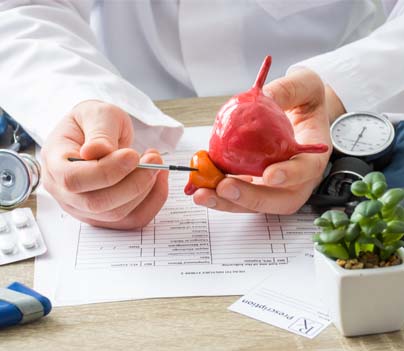-
 Mail us
Mail usinfo@myhealthhospitals.com
-
 Toll Free
Toll Free+91 9111674111
- Book Appointment
Urology
Benign Prostatic Hyperplasia (BPH) is a non-cancerous enlargement of the prostate gland, commonly seen in men as they age. The prostate, located just below the bladder, tends to enlarge over time, leading to urinary flow issues.
An enlarged prostate can cause symptoms like weak urine flow, incomplete bladder emptying, and sometimes urinary retention. In severe cases, it may even affect kidney function due to backflow of urine.
Treatment for BPH depends on the severity of symptoms, prostate size, and overall health. Options include both medical management and advanced surgical treatments such as laser therapy for effective and long-lasting results.
The exact cause of prostate enlargement isn’t fully understood, but several risk factors increase the likelihood of developing Benign Prostatic Hyperplasia (BPH):
Age: Men over 40 are more likely to experience prostate enlargement due to natural hormonal changes with aging.
Family History: Having a close relative with prostate enlargement or prostate cancer increases your risk of developing BPH.
Diabetes and Heart Disease: Research suggests that men with diabetes or cardiovascular conditions are at a higher risk of BPH.
Lifestyle Factors: Obesity and lack of physical activity can contribute to prostate enlargement. Maintaining a healthy weight and regular exercise may help reduce risk.

The severity of symptoms in prostate enlargement does not always depend on the size of the prostate. Some men with mild enlargement experience significant discomfort, while others with larger glands may have minimal symptoms.
Common symptoms of BPH include:
Less common symptoms may include:

To diagnose Benign Prostatic Hyperplasia (BPH) and rule out other urinary conditions, your urologist may recommend several tests to assess prostate size, urinary flow, and overall urinary tract health.
Ultrasound (Abdomen and Pelvis): Helps determine prostate size and bladder function by measuring pre- and post-void urine volume to decide between medical or surgical treatment.
Digital Rectal Examination (DRE): The urologist gently examines the prostate through the rectum to check for enlargement, tenderness, or irregularities.
Complete Urine Examination: Identifies urinary tract infections or other conditions that can mimic BPH symptoms.
Blood Tests: Used to evaluate kidney function and rule out complications related to prostate enlargement.
Prostate-Specific Antigen (PSA) Test: Measures PSA levels in the blood, which may rise due to prostate enlargement, infection, or prostate cancer.
Uroflowmetry: Assesses urine flow rate and strength to evaluate bladder outlet obstruction caused by an enlarged prostate.
TRUS-Guided Prostate Biopsy: A transrectal ultrasound-guided procedure that collects tissue samples to rule out prostate cancer when necessary.
Urodynamic and Pressure Flow Studies: Measures bladder pressure and function using a catheter to understand how the bladder responds during filling and emptying.
Cystoscopy: A flexible, lighted scope is inserted through the urethra under local anesthesia to visualize the prostate, bladder, and urinary tract for any obstruction or damage.
Multiple treatment options are available for prostate enlargement. The best choice depends on your prostate size, age, symptom severity, and overall health condition.
For mild to moderate symptoms, your urologist may recommend:
Surgery is advised for patients who do not respond to medications, have urinary retention, bladder stones, recurrent infections, or kidney issues.
At My Health Hospitals, Kukatpally, our expert urologists use the latest Holmium and Thulium laser systems for safer, faster, and more effective prostate treatments with minimal hospital stay.

The best treatment for enlarged prostate involves minimally invasive as well as laser procedures. While medications can treat mild symptoms of BPH, surgical methods have long-term health benefits. Advanced laser and minimally invasive methods for enlarged prostate treatment offer a high success rate, no complications, negligible chances of recurrence, and a faster recovery. Discuss your medical health with the doctor to know the best treatment for BPH near you.
Medications are usually effective for mild symptoms of enlarged prostate treatment. Medications such as alpha-blockers, and pain relievers can help manage mild symptoms of an enlarged prostate. However, the effectiveness of medicines usually varies depending on the severity of the condition and the medical health of the patient.
TURP surgery cost in India usually starts from Rs. 70,000 and can go up to Rs. 1 lakhs depending on several factors such as selection of hospital, choice of urologist, insurance coverage, etc. Get in touch with us to know more about the TURP surgery cost in India.
You can resume your daily routine within a week after your enlarged prostate (BPH) surgery. However, full recovery may take time and it is generally advisable to consult with your doctor before returning to work.
HOLEP surgery cost in India usually starts from Rs. 1 lakhs and can go up to Rs. 1.5 lakhs. However, the overall cost of BPH treatment varies depending on several factors. Get in touch with us to get a safe and cost-effective treatment for HOLEP surgery in India.
The latest surgical procedures for enlarged prostate treatment in India include laser procedures which offer faster recovery, almost zero complications, and fewer hospital stays. Some of the latest procedures for enlarged prostate treatment include the following –
The cost of BPH surgery in India usually starts from Rs. 60,000 for minimally invasive procedures. BPH surgery cost for laser procedure approximately starts from Rs. 1 lakhs. However, the overall surgery cost can vary depending on several factors. Call us to get a cost estimate of enlarged prostate surgery near you.
You may experience slight pain around the surgical site after the surgery. In addition, there may be a slight burning sensation while urinating which subsides within 2-3 days. The doctor generally prescribes medications to reduce the pain after the BPH surgery.
Just like any other surgery, there is a possibility of complications after your BPH treatment. Chances of risks usually depend on the medical condition of the patient, the surgical experience of the BPH doctor, and how strictly the patient follows the post-surgery tips. Possible complications after BPH surgery include the following
Several home remedies and medications can help shrink an enlarged prostate and manage mild symptoms. Medications such as alpha-blockers, dutasteride, 5-Alpha Reductase Inhibitors (5-ARIs), or a combination of two different medicines can be effective in reducing the size of the enlarged prostate. However, for long-term health benefits, surgical procedures are very effective in treating an enlarged prostate.
If you cannot find answers to your queries, please fill out the ENQUIRY form or call the number below. We will contact you shortly
+91 9111674111Visit any of our My Health Hospitals branches for advanced medical care and expert consultations.
H.No 15-24-212, MIG-212, Rd Number 1, K P H B Phase 1, Kukatpally, Hyderabad, Telangana 500072
H.No:-12-5-30, WhiteHouse, Moula Ali Rd, South Lalaguda, Tarnaka, Secunderabad, Telangana 500017